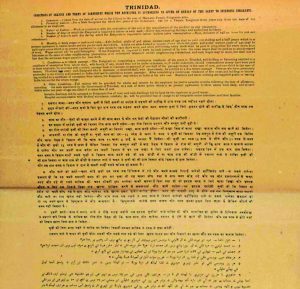Ravi Dev: Indian Heritage Month 2024
The system of indenture was a government-to-government arrangement: it imposed obligations and conferred rights both on the employer and the indentured labourer. The penalties which either incurred for violation of the terms were set out in the agreement (“Girmit”), which the emigrant signed. This is a copy of one such contract for Trinidad. We note that, unlike what has been claimed recently, it did not mention anything about land for the indentureds. There is a right to a return passage to India, which was totally covered by the employer in the beginning, but gradually whittled away as below by 1893.
As the copy below shows, it was written in English and an Indian language.
Conditions of Service and Terms of Agreement which the Recruiter is Authorised to offer on behalf of the Agent to intending Emigrants
1. Period of Service — For male Emigrants five years from the date of allotment; for female Emigrants three, years from the date of allotment.
2. Nature of Labour — Work in connection with the cultivation of the soil or the manufacture of the produce on any plantation.
3. Number of Days on which the Emigrant is required to Labour in each week. – Every day, excepting Sundays and authorised holidays.
4. Number of hours in each Day during which the emigrant is required to Labour without extra Remuneration. — Nine, inclusive of half an hour for rest and refreshment .
5. Monthly or Daily Wages or Task Work Rates. – Able-bodied adults of and above 16 years of age shall be paid 1s 1/2p (25 cents), which is at present equivalent to 12 annas and 6 pie for each day’s work. Adults not able-bodied, or minors of and above 10 years and under 16 years of age shall be paid 8d., which is at present equivalent to 8 annas for each day’s work, and when performing extra work, shall be paid in proportion for each extra hour of work. Wages earned will be paid fortnightly. If the Emigrant is required to work by task instead of by time, the same wages shall be paid as to unindentured labourers on the same or neighbouring plantations, or to indentured labourers on the neighbouring plantations; and such wages may be more, but shall not be less than the minimum wages payable for time work.
6. Conditions as to return passage – The Emigrant, on completing a continuous residence of ten years…and holding or becoming entitled to a certificate of exemption from labour, shall, with family if any, should they not be under indenture, or, if under indenture, should commutation money have been paid to their employer, be provided with a return passage back to Calcutta on payment of one-half of the passage money in the case of men, and one-third in the case of women. Provided that every such Emigrant who is destitute or disabled shall, with dependents, be entitled to a free return passage. Persons who have previously proceeded to this Colony and returned to India shall not be entitled to return passages…Blankets and warm clothing are supplied gratis on leaving India, but not for the return voyage.
7. Other’ Conditions — Full rations will be provided for adults and minors by the employer for 12 calendar months following the date of allotment, according to the scale sanctioned by the government…at a cost of 3d., which is at present equivalent to three annas each daily, and to each infant under 10 years of age, one-third of a ration free of cost. Suitable dwellings will be assigned to Emigrants free of rent, and such dwellings will be kept by the employer in good repair. Hospital accommodation with medical attendance, comforts, &c, will be provided free of charge to all Emigrants under indenture and their families.
